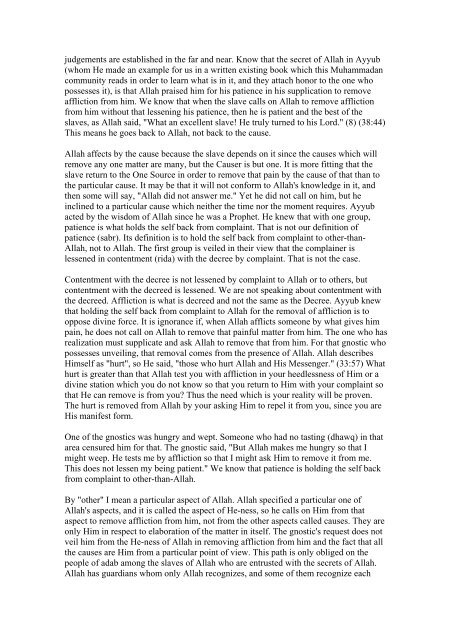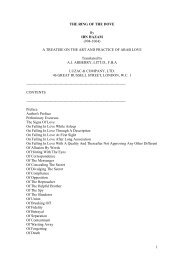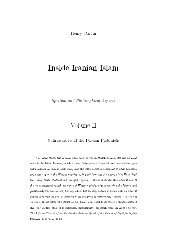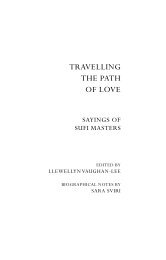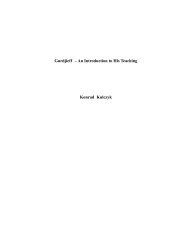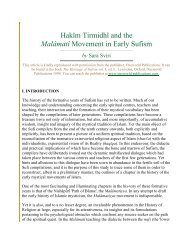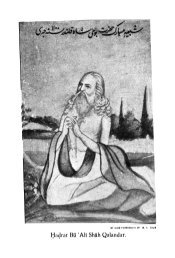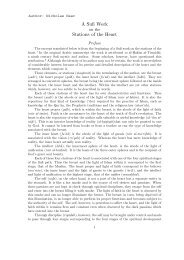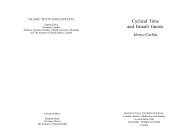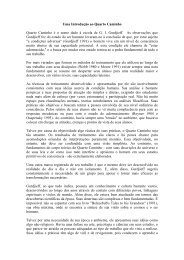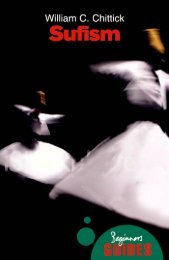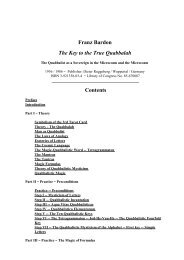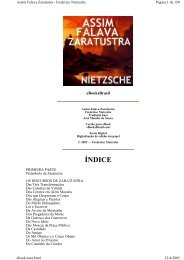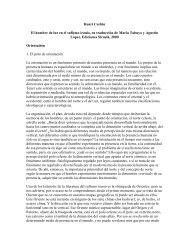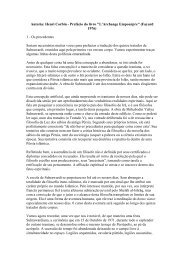Fusus al-Hikam The Seals of Wisdom by Shaykh al ... - ImagoMundi
Fusus al-Hikam The Seals of Wisdom by Shaykh al ... - ImagoMundi
Fusus al-Hikam The Seals of Wisdom by Shaykh al ... - ImagoMundi
Create successful ePaper yourself
Turn your PDF publications into a flip-book with our unique Google optimized e-Paper software.
judgements are established in the far and near. Know that the secret <strong>of</strong> Allah in Ayyub<br />
(whom He made an example for us in a written existing book which this Muhammadan<br />
community reads in order to learn what is in it, and they attach honor to the one who<br />
possesses it), is that Allah praised him for his patience in his supplication to remove<br />
affliction from him. We know that when the slave c<strong>al</strong>ls on Allah to remove affliction<br />
from him without that lessening his patience, then he is patient and the best <strong>of</strong> the<br />
slaves, as Allah said, "What an excellent slave! He truly turned to his Lord." (8) (38:44)<br />
This means he goes back to Allah, not back to the cause.<br />
Allah affects <strong>by</strong> the cause because the slave depends on it since the causes which will<br />
remove any one matter are many, but the Causer is but one. It is more fitting that the<br />
slave return to the One Source in order to remove that pain <strong>by</strong> the cause <strong>of</strong> that than to<br />
the particular cause. It may be that it will not conform to Allah's knowledge in it, and<br />
then some will say, "Allah did not answer me." Yet he did not c<strong>al</strong>l on him, but he<br />
inclined to a particular cause which neither the time nor the moment requires. Ayyub<br />
acted <strong>by</strong> the wisdom <strong>of</strong> Allah since he was a Prophet. He knew that with one group,<br />
patience is what holds the self back from complaint. That is not our definition <strong>of</strong><br />
patience (sabr). Its definition is to hold the self back from complaint to other-than-<br />
Allah, not to Allah. <strong>The</strong> first group is veiled in their view that the complainer is<br />
lessened in contentment (rida) with the decree <strong>by</strong> complaint. That is not the case.<br />
Contentment with the decree is not lessened <strong>by</strong> complaint to Allah or to others, but<br />
contentment with the decreed is lessened. We are not speaking about contentment with<br />
the decreed. Affliction is what is decreed and not the same as the Decree. Ayyub knew<br />
that holding the self back from complaint to Allah for the remov<strong>al</strong> <strong>of</strong> affliction is to<br />
oppose divine force. It is ignorance if, when Allah afflicts someone <strong>by</strong> what gives him<br />
pain, he does not c<strong>al</strong>l on Allah to remove that painful matter from him. <strong>The</strong> one who has<br />
re<strong>al</strong>ization must supplicate and ask Allah to remove that from him. For that gnostic who<br />
possesses unveiling, that remov<strong>al</strong> comes from the presence <strong>of</strong> Allah. Allah describes<br />
Himself as "hurt", so He said, "those who hurt Allah and His Messenger." (33:57) What<br />
hurt is greater than that Allah test you with affliction in your heedlessness <strong>of</strong> Him or a<br />
divine station which you do not know so that you return to Him with your complaint so<br />
that He can remove is from you? Thus the need which is your re<strong>al</strong>ity will be proven.<br />
<strong>The</strong> hurt is removed from Allah <strong>by</strong> your asking Him to repel it from you, since you are<br />
His manifest form.<br />
One <strong>of</strong> the gnostics was hungry and wept. Someone who had no tasting (dhawq) in that<br />
area censured him for that. <strong>The</strong> gnostic said, "But Allah makes me hungry so that I<br />
might weep. He tests me <strong>by</strong> affliction so that I might ask Him to remove it from me.<br />
This does not lessen my being patient." We know that patience is holding the self back<br />
from complaint to other-than-Allah.<br />
By "other" I mean a particular aspect <strong>of</strong> Allah. Allah specified a particular one <strong>of</strong><br />
Allah's aspects, and it is c<strong>al</strong>led the aspect <strong>of</strong> He-ness, so he c<strong>al</strong>ls on Him from that<br />
aspect to remove affliction from him, not from the other aspects c<strong>al</strong>led causes. <strong>The</strong>y are<br />
only Him in respect to elaboration <strong>of</strong> the matter in itself. <strong>The</strong> gnostic's request does not<br />
veil him from the He-ness <strong>of</strong> Allah in removing affliction from him and the fact that <strong>al</strong>l<br />
the causes are Him from a particular point <strong>of</strong> view. This path is only obliged on the<br />
people <strong>of</strong> adab among the slaves <strong>of</strong> Allah who are entrusted with the secrets <strong>of</strong> Allah.<br />
Allah has guardians whom only Allah recognizes, and some <strong>of</strong> them recognize each


